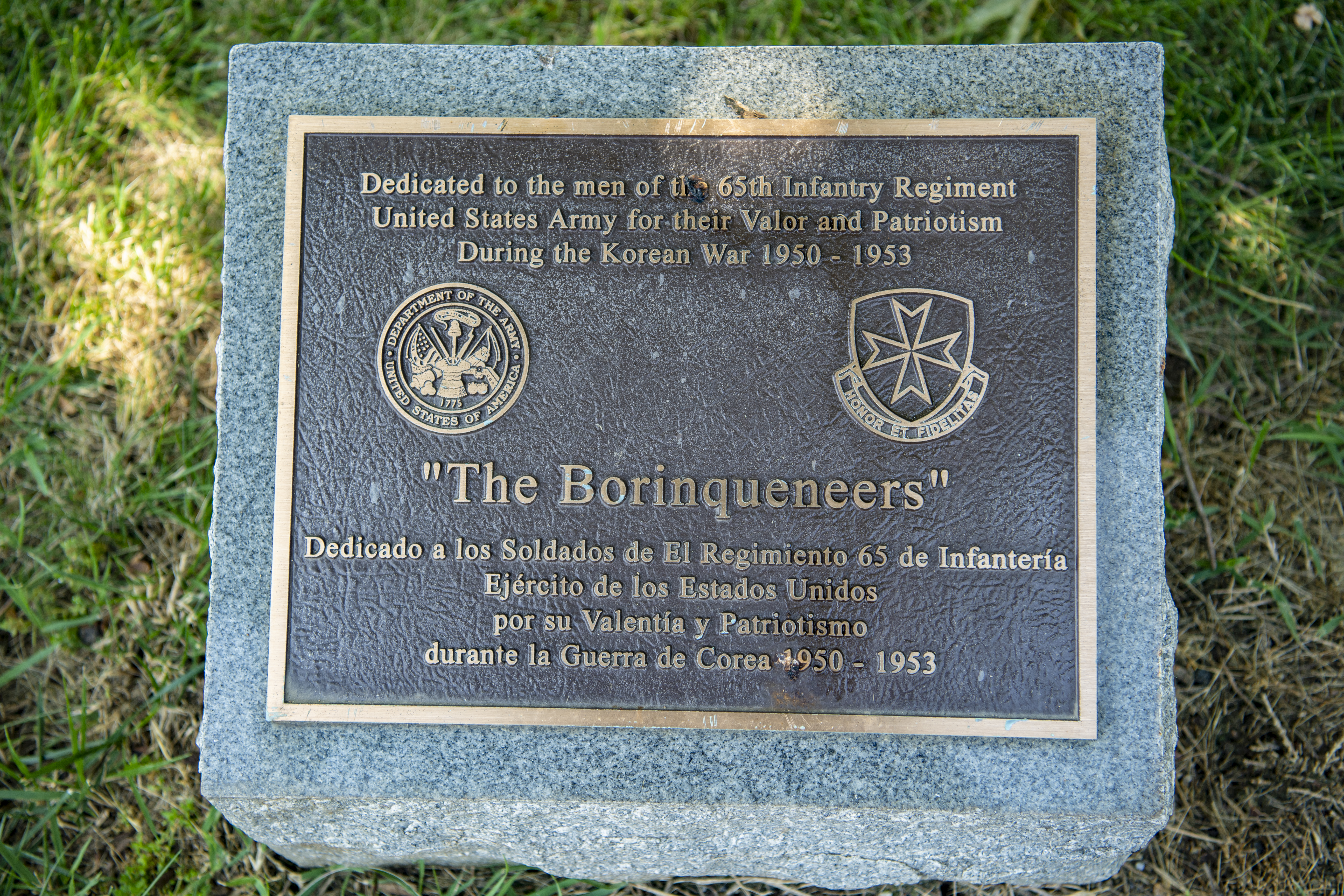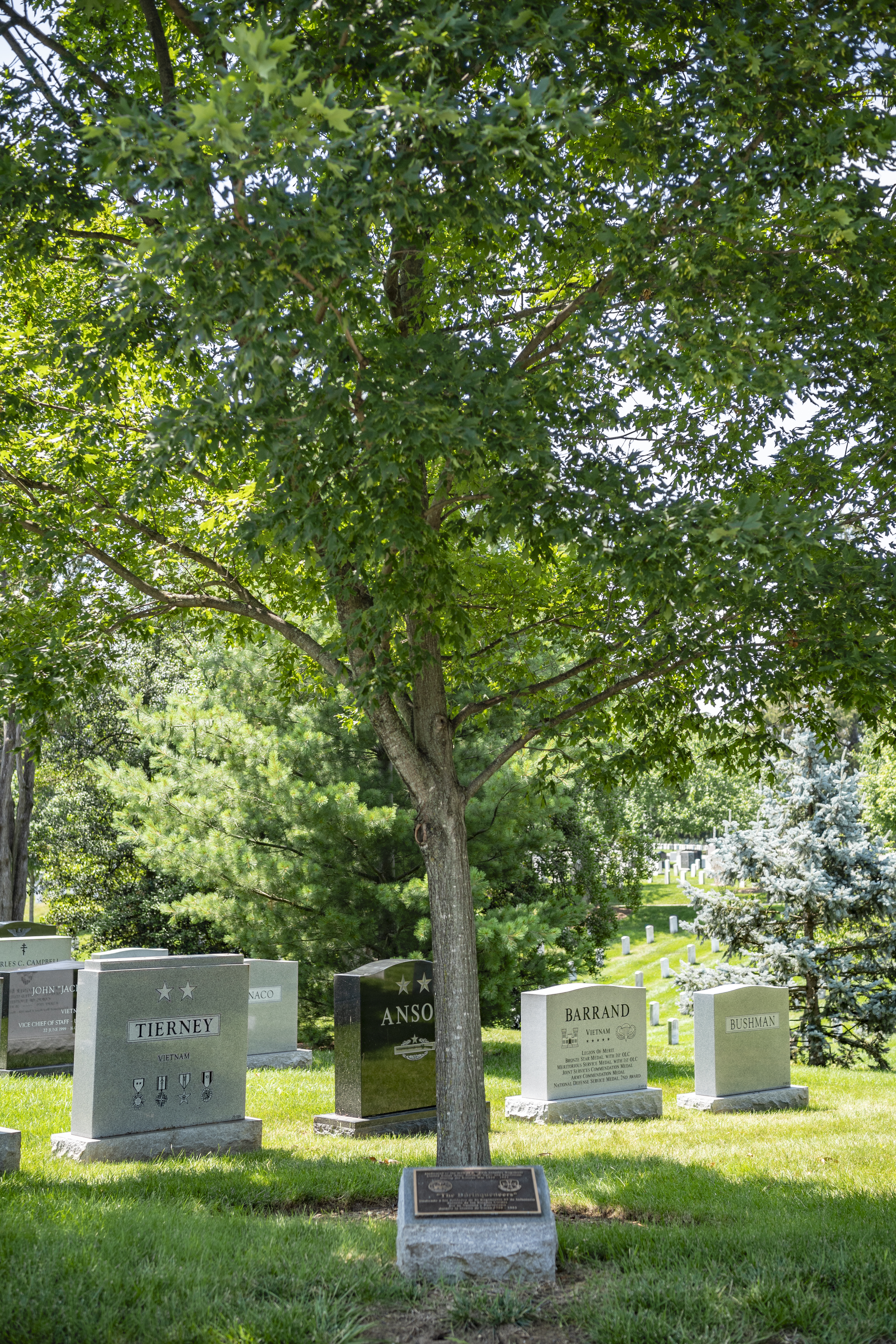"The Borinqueneers"(65th Infantry) Memorial Tree and Plaque

The Borinqueneers Memorial Tree and Plaque honor the Korean War service of the U.S. Army’s 65th Infantry Regiment, which consisted almost entirely of soldiers from Puerto Rico. Approximately 65,000 Puerto Ricans served during the Korean War, most with the 65th. Nicknamed “The Borinqueneers,” after the Taino name for Puerto Rico (“Borinquen”), the unit originated in 1899 as the Battalion of Porto Rican Volunteers, shortly after the United States gained control of Puerto Rico as a result of the Spanish-American War. It officially became part of the U.S. Army in 1908 and was designated as the 65th Infantry Regiment in 1920. The 65th served honorably in both World War I and World War II, albeit with restrictions on combat service due to segregation and racial discrimination.
The Borinqueneers are most distinguished for their service in the Korean War. On July 26, 1948, President Harry S. Truman issued Executive Order 9981, which prohibited racial discrimination in the U.S. armed forces and led to the desegregation of military units. In Korean two years later, the United States entered its first war with a mostly integrated military; desegregation was a process, however, and the 65th remained almost entirely composed of Puerto Rican enlisted soldiers when the United States entered the war in June 1950.
 In August 1950, the 65th Infantry Regiment arrived in Pusan, South Korea and went into action almost immediately. The unit's many combat successes included helping to safely evacuate American troops from North Korea’s Chosin Reservoir following a brutal 17-day battle, amid subzero temperatures, in November-December 1950. Still, Puerto Rican soldiers faced racial discrimination from some white officers, who ordered them to shave their mustaches, prohibited them from eating rice and beans, and punished them for speaking Spanish. Protests against such treatment led, in late 1952, to the court martials of 95 men. Less than a year later, the Secretary of the Army granted clemency or pardons to these soldiers; the majority chose to return to military service.
In August 1950, the 65th Infantry Regiment arrived in Pusan, South Korea and went into action almost immediately. The unit's many combat successes included helping to safely evacuate American troops from North Korea’s Chosin Reservoir following a brutal 17-day battle, amid subzero temperatures, in November-December 1950. Still, Puerto Rican soldiers faced racial discrimination from some white officers, who ordered them to shave their mustaches, prohibited them from eating rice and beans, and punished them for speaking Spanish. Protests against such treatment led, in late 1952, to the court martials of 95 men. Less than a year later, the Secretary of the Army granted clemency or pardons to these soldiers; the majority chose to return to military service.
Some 61,000 Puerto Ricans served in the U.S. Army during the Korean War, mostly with the 65th Infantry Regiment. More than 740 men were killed, and the unit’s decorations included one Medal of Honor, nine Distinguished Service Crosses, 250 Silver Stars, more than 600 Bronze Stars and more than 2,700 Purple Hearts. According to their Congressional Medal citation, the Borinqueneers represent “the contributions to the armed forces that have been made by hundreds of thousands of brave and patriotic United States citizens from Puerto Rico over generations, from World War I to the most recent conflicts in Afghanistan and Iraq.”
The memorial tree in Section 21 of the cemetery is a sugar maple. The plaque, in both English and Spanish, reads: “Dedicated to the men of the 65th Infantry Regiment United States Army for their Valor and Patriotism During the Korean War 1950-1953” / “Dedicado a los Soldados de El Regimiento 65 de Infanteria Ejercito de los Estados Unidos por su Valentia y Patriotismo durante la Guerra de Corea 1950-1953.”
► Explore our Education Program materials to learn more about the Borinqueneers.